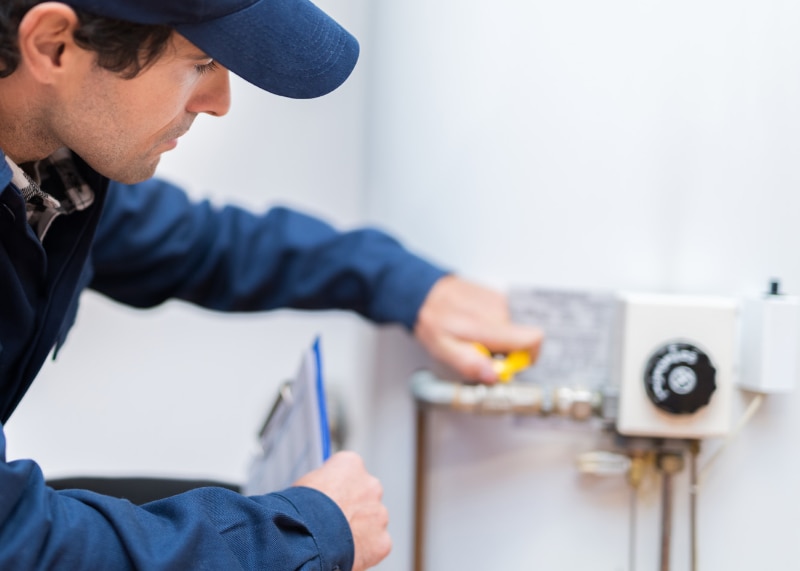We have uncovered this post involving Water Heater Repair and Troubleshooting below on the net and felt it made sense to talk about it with you over here.

Envision starting your day without your routine hot shower. That already sets an inadequate tone for the rest of your day.
Every residence requires a reputable water heater, yet only a few understand how to manage one. One easy way to maintain your hot water heater in top shape is to look for faults consistently and also repair them as quickly as they appear.
Bear in mind to shut off your water heater prior to sniffing around for faults. These are the hot water heater faults you are more than likely to run into.
Water too warm or also chilly
Every hot water heater has a thermostat that establishes how warm the water obtains. If the water coming into your house is also warm in spite of establishing a convenient optimum temperature, your thermostat might be malfunctioning.
On the other hand, also cold water may be because of a stopped working thermostat, a damaged circuit, or inappropriate gas circulation. For instance, if you use a gas hot water heater with a busted pilot burner, you would get cold water, even if the thermostat remains in perfect problem. For electric heating systems, a blown fuse may be the offender.
Not enough hot water
Hot water heater been available in numerous sizes, depending upon your warm water demands. If you run out of warm water before everyone has actually had a bathroom, your water heater is too tiny for your family size. You should consider setting up a larger water heater tank or choosing a tankless water heater, which takes up less area and is extra durable.
Unusual noises
There go to least five sort of noises you can hear from a water heater, yet one of the most common analysis is that it's time for the hot water heater to retire.
First off, you need to recognize with the regular appears a water heater makes. An electrical heating unit might sound different from a gas-powered one.
Popping or banging noises usually imply there is a slab of sediment in your storage tanks, and it's time to cleanse it out. On the other hand, whistling or hissing sounds might just be your shutoffs letting some pressure off.
Water leaks
Leaks might originate from pipelines, water connections, shutoffs, or in the worst-case situation, the tank itself. Over time, water will wear away the storage tank, and discover its escape. If this takes place, you need to replace your hot water heater as soon as possible.
Nevertheless, prior to your change your entire storage tank, make certain that all pipes remain in place which each valve works flawlessly. If you still require help recognizing a leak, call your plumber.
Rust-colored water
Rust-colored water indicates one of your hot water heater components is rusted. Maybe the anode rod, or the container itself. Your plumber will certainly have the ability to recognize which it is.
Warm water
Regardless of exactly how high you established the thermostat, you will not obtain any type of hot water out of a heating system well past its prime. A hot water heater's performance might decrease with time.
You will also get warm water if your pipes have a cross connection. This implies that when you switch on a tap, warm water from the heater streams in along with regular, cold water. A cross link is easy to area. If your hot water faucets still pursue shutting the hot water heater shutoffs, you have a cross connection.
Discoloured Water
Rust is a significant root cause of filthy or discoloured water. Deterioration within the water container or a stopping working anode rod might cause this discolouration. The anode rod protects the container from rusting on the within as well as ought to be inspected annual. Without a pole or an appropriately functioning anode rod, the warm water swiftly rusts inside the storage tank. Get in touch with an expert hot water heater technician to determine if replacing the anode pole will certainly fix the problem; otherwise, replace your hot water heater.
Conclusion
Ideally, your hot water heater can last 10 years prior to you need a change. However, after the 10-year mark, you might experience any of these mistakes more regularly. At this moment, you ought to include a brand-new hot water heater to your spending plan.
How To Troubleshoot 3 Common Water Heater Problems in Twin Cities
The Water Heater Is Leaking
A leaky cold water inlet valve A loose pipe fitting A leaky temperature and pressure relief valve A corroded anode rod A cracked tank Turn Off Your Water Heater:
Shut off your gas water heater by turning the gas valve on the unit to the “OFF” position. Shut off your electric water by switching its power off at your electrical panel. Look for a two-pole breaker labeled “water heater” and turn it to the “OFF” position. Move the ball valve connected to the water heater to be perpendicular to the piping at a 90° angle. Look for the Leak:
Depending on whether the water is coming from the tank's top or bottom, you’ll want to look for the leak in different locations.
If the leak comes from the top of the tank, carefully look for water escaping from the cold water inlet valve or loose pipe fittings. Rusted hot and cold water valves can have loose connections with the tank, with water leaking out of them.
https://mspplumbingheatingair.com/blog/how-to-troubleshoot-3-common-water-heater-problems
We hope you enjoyed our part on Common Problems with Your Home Water Heater. Many thanks for spending some time to browse our post. Enjoyed our write up? Please share it. Help another person discover it. Many thanks for your time. Don't hesitate to come by our website back soon.
Professional touch? Contact.